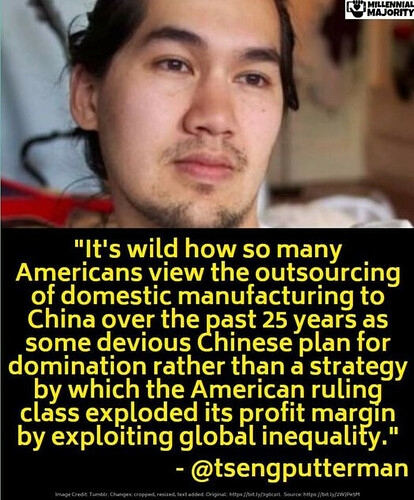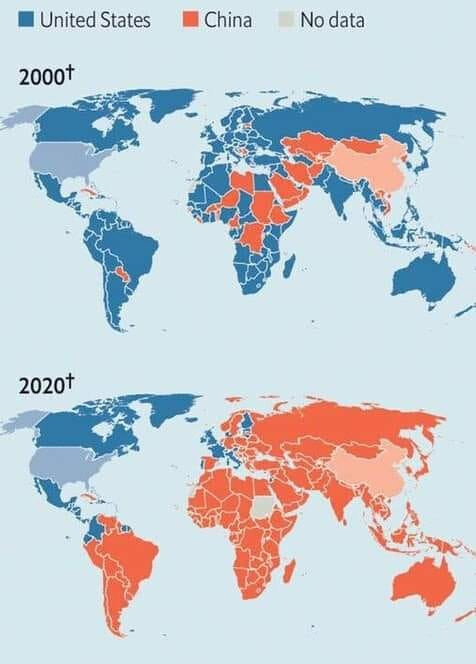I remember being very impressed by Fort Dunlop whenever driving by on the M6. I worked in Fiat England on the Great West Road when many other wonderful buildings were still in use for their original purpose.
The problem with reserve currencies known as the Triffin Dilemma might be of interest. US exports itself inflation and imports everything else. Hence moves from biggest creditor nation to biggest debtor nation, the predicted collapse of manufacturing in the West all contained in Triffin’s Dilemma from 1959.
Interesting. I didn’t know about Triffin but have just read the Wikipedia page.
Especially interesting that Zhou Xiaochuan proposed going back to Keynes’ original plan for a reserve currency separate from national currencies - ( ‘on almost every point where Keynes was overruled by the Americans during the Bretton Woods negotiations, he was later proved correct by events’) - and that in fact the world does seem to be gradually adopting Zhou’s proposal.
I’m surprised the article I linked - by a professor of economics and public policy at Harvard and former IMF chief economist - didn’t broach this.
Lack of personal freedom to those who sign up I shouldn’t wonder.
And the indifference of the “ruling class” to the obvious knock on effect of skills, technology and intellectual property transfer to China reducing US competitiveness. All a direct result of the short term focus on quarerly earnings by executives, analysts and shareholders.
There’s an added irony to America complaining about the rise of China - since if you read accounts of technology transfer, copyright violation, labour costs, etc, from the 19th century, you find British politicians and business leaders complaining about unfair competition from America in almost exactly the same words that are now used by America about China.
Not sure about France in this respect - but certainly in Zola’s La Terre there is much discussion of how corn from the prairies and the mechanisation of American agriculture (developed by stealing European IPR) was about to destroy French farming.
Perhaps the biggest danger is one of long term planning - Western governments essentially working short-term within election cycles, whereas we know the Chinese, with 5000 years of political history, don’t work in quite the same way. Sometimes I think Europe forgets the long term dynamics of its history, our house was built a centruy before America was ‘discovered’. Most of France didn’t enter the modern world until the mid-20th century (and some of my neighbours are still on their way there!)
On the other hand, the US’s post-WWII self image has been of a techologically progressive democracy; yet if one sets aside Teslar (I’d love one!) today it seems that most of the best and most affordable cars of the next decade will be Chinese marques. Sadly, lumbering Jeep, not Teslar remains the true face of the contemporary US auto industry. On the other hand is this anything new? Within my experience, apart fro mhi-tech items, what the US makes best are fairly traditional good quality things such as work clothing and tools! (though the unis produce superbly bound books) It’s like everything Soviet Russia aspired to produce, but never did. (there may be a PhD thesis in that, but I’m too old to do another one)
I think there’s a correlation between the quality of traditional lo-tech US artefacts and small c US conservatism - these products are American, their quality is indisputable and their design dates back to a time when America was not plagued by uncertainties and there was a dominant discourse
I agree with you John.
The loss of intellectual property and knowhow has been deeply harmful and utterly careless short term thinking of the West.
Although I think Trump overegged it and Huawei has bern targeted unfairly I am quite concerned at what looks like the militarisation of China. Nk
Interesting map from The Economist of the numbers of investment and trade partnerships between various countries and America vs China…
Eeek.
So I’m enjoying this discussion and wondering why not much is being said about China’s social crediting system…
(And if I dare say it the links to health passes/passé sanitaire/health passports…)
Possibly because criticism of Chinese ways of doing things tends not to go down well with Xi Jin Ping and co. It was properly rolled out a good six years now, what do you think about it?
It has bothered me greatly for a long while…that dissident voices can be denied travel and access to their bank accounts and there is no human on the other end of the phone to discuss with…only AI
It’s been obvious to techies for at least two decades Geof. Chinese “slave” labour was required to boost earnings per share and make shareholders and executives rich. The leakage of intellectual capital was obvious to anybody who cared to look. What wasn’t shared was stolen, but what the heck, we’re all getting rich.
Next on the agenda, war over Taiwan? IMO notwithstanding the past the Japanese need to step up. And, in Europe, dare one say it, Germany.
Interesting - direct diplomatic confrontation between China and ‘the West’, led by the US - turned out to be “a display of raw Chinese political power”…

